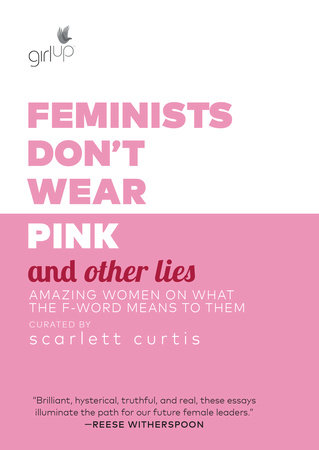Feminists Don't Wear Pink and Other Lies
Amazing Women on What the F-Word Means to Them
Curated by Scarlett Curtis
Hardcover
October 2, 2018 | ISBN 9781984819178
AmazonBarnes & NobleBooks A MillionBookshop.orgHudson BooksellersPowell'sTargetWalmart
Ebook
October 2, 2018 | ISBN 9781984819185
AmazonApple BooksBarnes & NobleBooks A MillionGoogle Play StoreKobo
About the Book
“Brilliant, hysterical, truthful, and real, these essays illuminate the path for our future female leaders.”—Reese Witherspoon
A diverse group of celebrities, activists, and artists open up about what feminism means to them, with the goal of helping readers come to their own personal understanding of the word.
“As a feminist who loves pink, I give this brilliant book of essays an enthusiastic ‘YES.’”—Mindy Kaling
Feminists Don’t Wear Pink and Other Lies is a collection of writing from extraordinary women, from Hollywood actresses to teenage activists, each telling the story of her personal relationship with feminism. Often funny, sometimes surprising, and always inspiring, this book aims to bridge the gap between the feminist hashtag and the scholarly text by giving women the space to explain how they actually feel about feminism.
Published in partnership with Girl Up, a campaign of the United Nations Foundation, and curated by writer and Pink Protest founder Scarlett Curtis, this book’s contributors include:
Bridget Jones (by Helen Fielding) • Saoirse Ronan • Emma Watson • Jameela Jamil • Kat Dennings • Keira Knightley • Alicia Garza • Jodie Whittaker • Whitney Wolfe Herd • Beanie Feldstein • Zoe Sugg • Angela Yee • Akilah Hughes • Evanna Lynch • Chimwemwe Chiweza • Alison Sudol • Lolly Adefope • Elyse Fox • Charlie Craggs • Charlotte Elizabeth • Alaa Murabit • Trisha Shetty • Tapiwa Maoni • Lydia Wilson • Amy Trigg • Tanya Burr • Karen Gillan • Swati Sharma • Bronwen Brenner • Emily Odesser • Emi Mahmoud • Gemma Arterton • Lauren Woodhouse-Laskonis • Tasha Bishop • Skai Jackson • Maryam and Nivaal Rehman • Nimco Ali • Amika George • Jordan Hewson • Alice Wroe • Claire Horn • Dolly Alderton • Rhyannon Styles • Grace Campbell • Liv Little • Olivia Perez
A diverse group of celebrities, activists, and artists open up about what feminism means to them, with the goal of helping readers come to their own personal understanding of the word.
“As a feminist who loves pink, I give this brilliant book of essays an enthusiastic ‘YES.’”—Mindy Kaling
Feminists Don’t Wear Pink and Other Lies is a collection of writing from extraordinary women, from Hollywood actresses to teenage activists, each telling the story of her personal relationship with feminism. Often funny, sometimes surprising, and always inspiring, this book aims to bridge the gap between the feminist hashtag and the scholarly text by giving women the space to explain how they actually feel about feminism.
Published in partnership with Girl Up, a campaign of the United Nations Foundation, and curated by writer and Pink Protest founder Scarlett Curtis, this book’s contributors include:
Bridget Jones (by Helen Fielding) • Saoirse Ronan • Emma Watson • Jameela Jamil • Kat Dennings • Keira Knightley • Alicia Garza • Jodie Whittaker • Whitney Wolfe Herd • Beanie Feldstein • Zoe Sugg • Angela Yee • Akilah Hughes • Evanna Lynch • Chimwemwe Chiweza • Alison Sudol • Lolly Adefope • Elyse Fox • Charlie Craggs • Charlotte Elizabeth • Alaa Murabit • Trisha Shetty • Tapiwa Maoni • Lydia Wilson • Amy Trigg • Tanya Burr • Karen Gillan • Swati Sharma • Bronwen Brenner • Emily Odesser • Emi Mahmoud • Gemma Arterton • Lauren Woodhouse-Laskonis • Tasha Bishop • Skai Jackson • Maryam and Nivaal Rehman • Nimco Ali • Amika George • Jordan Hewson • Alice Wroe • Claire Horn • Dolly Alderton • Rhyannon Styles • Grace Campbell • Liv Little • Olivia Perez
Read more
Close




